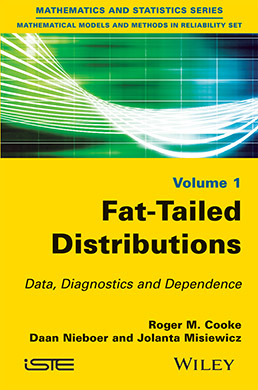
Roger M. Cooke, Resources for the Future, Washington, USA
Daan Nieboer, Erasmus Medical Centre – University Medical Centre Rotterdam, the Netherlands
Jolanta Misiewicz, Warsaw University of Technology, Poland
This book has been written for numerate non-specialists and serves three purposes.
Firstly, it gathers together mathematical material from diverse but related fields of order statistics, records, extreme value theory, majorization, regular variation and subexponentiality. Secondly, it presents a new measure of obesity. Thirdly, and most importantly, the authors hope to convince readers that fat-tail phenomena pose real problems; they are really out there and they seriously challenge our usual ways of thinking about historical averages, outliers, trends, regression coefficients and confidence bounds among many other things. Data on flood insurance claims, crop loss claims, hospital discharge bills, precipitation, and damages and fatalities from natural catastrophes drive this point home.
While most fat-tailed distributions are "bad", research into fat tails is one distribution whose tail will hopefully get fatter.
1. Fatness of Tail.
2. Order Statistics.
3. Records.
4. Regularly Varying and Subexponential Distributions.
5. Indices and Diagnostics of Tail Heaviness.
6. Dependence.
Roger M. Cooke works at Resources for the Future in Washington, USA and the University of Strathclyde, Dept. of Management Science in the UK. He is retired from the Delft University of Technology, Department of Mathematics, the Netherlands. His research interests include uncertainty analysis, risk analysis, dependence modeling, climate change and expert judgment.
Daan Nieboer works at the Dept. of Public Health, Erasmus Medical Centre – University Medical Centre Rotterdam, the Netherlands. His research interests include the development, validation and updating of clinical prediction models.
Jolanta Misiewicz works at the Dept. of Mathematics and Information Science, Warsaw University of Technology, Poland. Her research interests include random vectors and stochastic processes with stable, sub-stable, weakly stable and pseudo-isotropic (thus mostly heavy tail) distributions and connections with the geometry of Banach spaces.